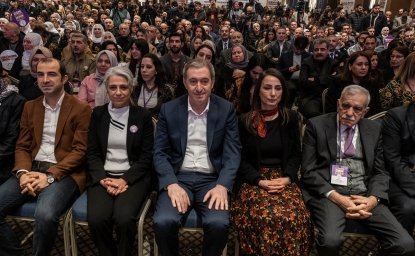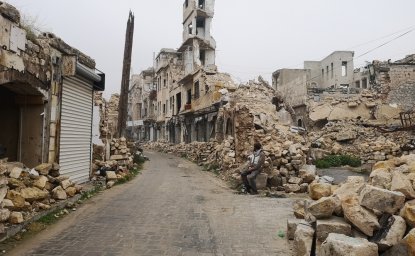The Turkish War on Afrin Jeopardizes Progress Made Since the Liberation of Raqqa


The Turkish operation in Afrin is not just another battle in a small corner of Syria, but represents a new stage in the Syrian civil war and anti-ISIS campaign. President Erdoğan’s two-month battle to capture Afrin signals that Turkey will no longer act through proxies, but is willing to intervene directly on Syrian territory to crush the Kurdish YPG forces and the experiment in self-rule they are defending.i Emboldened after claiming victory in Afrin, and enabled by Russia, Erdoğan is threatening further incursions into Syria and Iraq. Erdoğan has demanded that American troops withdraw from Manbij, so that he can attack the Syrian Democratic Forces (SDF) who are stationed in the area, and who have been our most reliable partners in the anti-ISIS coalition. If Erdoğan is not deterred, much of the progress made since the liberation of Raqqa could be in jeopardy. The Afrin intervention has already displaced at least 150,000 people. Many of them are Kurds, Yezidis, or Christians who established local government councils in the absence of the regime over the past five years. Even if imperfect, the self-administration is an embryonic form of democracy that includes women and minorities while promoting religious tolerance and linguistic diversity. As people flee, their experiment in self-administration will in all likelihood dissolve as well. Finally, the assault has led to the diversion of over one thousand Kurdish SDF forces to Afrin, thus putting the anti-ISIS campaign at risk. None of this is in the interest of the United States. And yet little has been done, either to alleviate the humanitarian crisis or engage Erdoğan. The United States relied on Kurdish fighters to liberate Raqqa and many other parts of Syria from the Islamic State. To stand by idly as Erdoğan orders NATO’s second largest army to decimate our Kurdish partners is a violation of our interests, obligations, and larger objectives in Syria. In what follows I will sketch out what is at stake in Afrin, based on research I began on the YPG in 2015 in Kobane and observations from a recent trip to northeastern Syria in March.
After the withdrawal of regime forces in 2012, the predominantly Kurdish population established a local self-administration known as the Democratic Confederation of Northern Syria, or simply: Rojava. In striving to preserve its autonomy from Damascus, the self-administration has sought recognition and protection from Russia and the United States. Both have carved out areas of operation along a so-called deconfliction line: an American zone primarily to the East of the Euphrates River, and a Russian zone to the West, where Afrin is located. East of the Euphrates River, the YPG has been integrated into the Syrian Democratic Forces (SDF) which includes Kurds and Arabs. In Afrin, the YPG is not integrated into the SDF. Many Kurds believe the Turkish assault began only after Russia gave a green light to Turkey, essentially abandoning its Kurdish protectorate. According to the Syrian Observatory for Human Rights, another agreement was reached in the past few days between Moscow and Ankara to hand over Tell Rifaat, a town to the East of Afrin currently under YPG control with some 50,000 inhabitants. Mike Pompeo, who President Trump has selected to replace Rex Tillerson as Secretary of State, has sharply criticized Russia’s role in Syria and advocated for a more hawkish approach towards Bashar Al-Assad. As the reshuffling at the State Department unfolds, US policy towards Syria remains uncertain. In the meantime Turkish-backed Islamists are establishing facts on the ground. And they continue pushing eastwards, in the direction of American and SDF troops.
The Turkish military began what it calls “Operation Olive Branch” in the Afrin district of northwest Syria on January 20. While Turkish warplanes carry out airstrikes, they rely on a combination of Salafist, jihadist, and extremist rebel groups on the ground.ii After two months of fighting, Turkish-backed militias entered the city of Afrin, while the YPG has vowed to continue fighting to liberate the city. Just four days after the intervention began, and after Erdoğan ordered US troops to withdraw from Manbij, President Trumpiii spoke on the phone with Erdoğan. Trump urged him to limit his military actions, avoid civilian casualties, and avoid any actions that would cause direct clashes between American and Turkish troops. On February 25, and in response to the situation in both Ghouta and Afrin, the UN Security Council adopted Resolution 2401, calling for a 30-day ceasefire in Syria. Lt. General Kenneth McKenzie warned that the US would be closer to defeating ISIS in the Euphrates River Valley if Turkey would stop fighting the Kurds.iv Finally, speaking on March 15 on the seven-year anniversary of the beginning of the Syrian uprising, National Security Advisor H.R. McMaster invoked the Holocaust to urge action in Syria.v
None of this halted or even slowed down Turkey’s cross-border assault. Despite the fact that the YPG fought back Islamic State insurgents all along the Turkish border, Erdoğan sees the YPG as a threat to Turkey’s national security and as an offshoot of the PKK. Erdoğan’s aggressive posturing towards Kurds in both Syria and Turkey stands in stark contrast to his policies just a few years earlier, when he introduced tentative reforms that the Kurdish minority in Turkey had been demanding for decades. Under Erdoğan’s leadership, the Turkish government entered into a ceasefire agreement with the PKK between 2013 and 2015. Of that he speaks no more.
The threat of Kurdish autonomy is now so ominous, that Erdoğan believes it needs to be crushed not only in Turkey, but also across the border in Syria. Erdoğan claims the assault in Afrin is only targeting the YPG. But the cross-border operation goes much further than this. Even if direct conflict between Turkish and American troops is avoided, there is a lot at stake. The intervention in Afrin represents a three-fold threat to:
1. The diverse civilian population including Kurds, Yezidis, Christians, as well as predominantly Sunni Arab IDPs who sought refuge there from other parts of Syria.
2. The model of local self-governance that has been set up following the withdrawal of regime forces. The local self-administration represents an embryonic form of democracy that includes women and minorities.
3. Finally, the campaign to defeat the Islamic State is at risk, as many Kurdish SDF fighters have diverted from Deir ez-Zor and other battlegrounds to defend Afrin.
Expulsion of Kurds, Yezidis, Christians: The Threat to Civilians
The local population of Afrin is predominantly Kurdish, but also includes Arabs as well as Christians, Yezidis, and a large IDP population. Many of these are groups who survived previous assaults by the Islamic State, and are now under fire from Turkish-backed Islamists. Already during the first week of the assault, a number of Yezidi villages were targeted. The Yezidis represent one of Iraq and Syria’s most vulnerable minority groups. The Yezidis of Iraq were subjected to a genocidal assault in the Sinjar mountain region, a disputed territory claimed by both the central government in Baghdad and the Kurdistan Regional Government in Erbil. Baghdad, Erbil, and the international community all failed to prevent the genocide, although anyone observing the situation could easily see that after capturing Mosul in June 2014, ISIS fighters began moving steadily in the direction of Sinjar, the ancestral homeland of the Yezidis. It was not hard to predict what would happen once ISIS arrived. The Yezidis are not Muslims, and ISIS made no secret of their intention to slaughter non-Muslims. Yet the international community failed to act. In Afrin, we are failing the Yezidis once again.
The situation in Afrin had become so dire that people were scrounging to pay smugglers $1,000 per person to get out. During my trip to northeast Syria in March, I met a young Kurdish businessman from Afrin. He was in Qamişlo for business, but had nine family members still in Afrin. He was calculating whether he could afford $9,000 to get everyone out of the city. In the end, his family was unable to even reach the smugglers and ended up being forced to simply walk on foot, including a three-year old child. Although a corridor was opened to allow civilians to flee, this also opens up the real possibility of demographic change if the Kurdish, Yezidi, and Christian population are permanently expelled. For this reason some residents of Afrin are refusing to leave, even as they are encircled by hostile forces.
Destroying Democratic Initiatives: The Threat to Gender Equality and the Local Self-Administration
The Rojava Revolution has often been described as a gender revolution, perhaps best symbolized by the women fighters in the YPJ. But important reforms in women’s rights have also been introduced in the civilian arena. Already in March 2011, at the very beginning of the Syrian uprising, Women’s Houses were established in the predominantly Kurdish regions of northern Syria. I visited the Women’s House (Mala Jinê) in Qamişlo, where the women explained to me how they engaged in dispute resolutions within families and cases of domestic violence. While other parts of Syria became engulfed in war, the withdrawal of the regime forces in 2012 allowed initiatives such as these to turn into more formalized government structures. The self-administration passed a Woman’s Law in 2012 that outlawed forced marriage, underage marriage, and polygamy. These local laws are enforced by the self-administration, and stand in contrast to Syrian law, which is based on Islamic Sharia and Hanafi jurisprudence. According to the Syrian Personal Status Law, polygamy is permitted, and the legal age of marriage for women is set at sixteen. However, a judge may decide to marry a girl at the age of thirteen. The self-administration of Rojava has set the legal age for marriage at eighteen and outlawed polygamy. According to critics, the Syrian Kurds are merely implementing PKK ideology in Rojava. The Woman’s Law passed by the self-administration, however, is actually similar to Turkey’s civil code, which also sets the legal age for marriage at 18 and also outlaws polygamy.
Laws such as these may be overturned, however, by the Islamist rebel groups who have now entered Afrin. Some of these militias espouse an ideology not unlike that of ISIS. In one recent video, an Islamist fighter called on Kurds to repent and come back to Islam. Although Kurds are predominantly Sunni Muslims, they are perceived by the FSA as infidels because of their secularism and embrace of other religious and ethnic minorities. In a recent video a Sunni Arab militiaman threatened to behead Kurds unless they convert to the extremist version of Islam they espouse, saying: "by Allah, if you repent and come back to Allah, then know that you are our brothers. But if you refuse, then we see that your heads are ripe, and that it's time for us to pluck them."vi
Torpedoing the Anti-ISIS Campaign: The Threat to the SDF and US-Kurdish Cooperation
Numerous Pentagon officials have readily acknowledged that Kurdish forces have been our most reliable allies in the fight against the Islamic State. General Joseph Votel, Head of the United States Central Command, recently testified before Congress that the SDF is the “most effective force on the ground in Syria”vii and that we “need them to finish this – to finish this fight.” Beginning in 2015, I started to conduct research among both male and female fighters in the YPG/YPJ. Among other things, I found that one of the reasons the Kurdish forces have been so effective is precisely because they view their fight against the Islamic State as part of a larger political battle, and not merely as a narrowly-defined military campaign.viii This is also one of the reasons why American and Kurdish interests align.
However, the cooperation between the United States and the Kurds within the SDF may now be at risk. The diversion of Kurdish SDF fighters to Afrin began slowly, but increased rapidly as the Turkish-backed rebels gained ground. Already in late February, State Department spokeswoman Heather Nauert acknowledged that the United States could no longer fight ISIS as effectively as we would like.
It is not in the interest of the United States to allow Afrin to be taken over by Islamists who expel the civilian population and destroy the secular and gender-egalitarian democratic initiatives. Nor is it in our interest to allow the anti-ISIS campaign to falter. It is not too late to act. Although Erdoğan has declared that Afrin is under Turkish control, YPG forces are still holding their ground, and have stated their intention to liberate Afrin and allow the local population to return. This could be the beginning of guerilla warfare. The YPG drove out the Islamic State from Kobane in 2015 after months of house-to-house fighting. They are vowing to do the same in Afrin.
In giving a green light for the Turkish assault, Putin betrayed both the YPG and the civilian population of Afrin. If the United States does the same, we will not only be abandoning our most reliable partners in the anti-ISIS campaign, but the principles of gender equality, secularism, and ethnic diversity which they have defended for over five years now in Afrin.
[[{"fid":"111241","view_mode":"default","fields":{"field_file_image_alt_text[und][0][value]":"A billboard in Qamişlo","field_file_image_title_text[und][0][value]":"","field_file_source[und][0][value]":"Photograph by Amy Austin Holmes, March 2018","field_file_caption[und][0][value]":"A billboard in Qamişlo, in the three languages used by the Democratic Confederation of Northern Syria: Syriac, Arabic, and Kurdish. Translation: “A Federal System is a System of Free Women and Free Men.”"},"type":"media","attributes":{"alt":"A billboard in Qamişlo","class":"media-element file-default"}}]]
i The YPG refers to the Yekîneyên Parastina Gel or People’s Protection Units. Women are organized in the Yekîneyên Parastina Jin (YPJ). Both are predominantly Kurdish but also include Arabs, Assyrians, as well as foreign volunteers.
ii Sirwan Kajjo, “Who are the jihadists fighting alongside Turkey in Syria?”, Gatestone Institute, March 20, 2018 https://www.gatestoneinstitute.org/12061/turkey-jihadists-syria
iii “Readout of President Donald J. Trump’s Call with President Recep Tayyip Erdoğan of Turkey,” Foreign Policy, 24 January 2018. https://www.whitehouse.gov/briefings-statements/readout-president-donald-j-trumps-call-president-recep-tayyip-Erdoğan-turkey-4/.
iv McIntyre, James, “The US could finish off ISIS if Turkey would stop fighting the Kurds, Pentagon says,” Washington Examiner, 15 March 2018 https://www.washingtonexaminer.com/policy/defense-national-security/the-us-could-finish-off-isis-if-turkey-would-stop-fighting-the-kurds-pentagon-says.
v Dion Nissenbaum, “McMaster Invokes Holocaust to Urge Action in Syria,” The Wall Street Journal, 15 March 2018 https://www.wsj.com/articles/mcmaster-invokes-holocaust-to-urge-action-in-syria-1521147717.
vi Patrick Cockburn, “Syria’s war of ethnic cleansing: Kurds threatened with beheading by Turkey’s allies if they don’t convert to extremism,” Independent, 12 March 2018 https://www.independent.co.uk/news/world/middle-east/syria-civil-war-assad-regime-turkey-afrin-kurds-eastern-ghouta-us-allies-militia-a8252456.html.
vii Eric Schmitt and Rod Nordland, “Amid Turkish Assault, Kurdish Forces Are Drawn Away From U.S. Fight With ISIS,” New York Times, 28 February 2018 https://www.nytimes.com/2018/02/28/world/middleeast/syrian-kurds-isis-american-offensive.html viii Amy Austin Holmes, “What are the Kurdish Women’s Units Fighting for in Syria?” The Washington Post, 23 December 2015 https://www.washingtonpost.com/news/monkey-cage/wp/2015/12/23/what-are-the-kurdish-womens-units-fighting-for-in-syria/?utm_term=.d43b670630b3
Author

Research Professor of International Affairs and Acting Director of the Foreign Area Officers Program, George Washington University

Middle East Program
The Wilson Center’s Middle East Program serves as a crucial resource for the policymaking community and beyond, providing analyses and research that helps inform US foreign policymaking, stimulates public debate, and expands knowledge about issues in the wider Middle East and North Africa (MENA) region. Read more

Explore More
Browse Insights & Analysis
MENA360°

Imamoglu’s Arrest Sparks Nationwide Unrest and Raises Fears for Turkish Democracy

